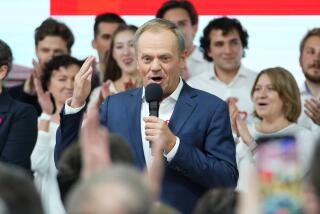Swedes Go to Polls Amid Diminished Hopes
- Share via
STOCKHOLM — Seven parties spanning the political spectrum are expected to win parliamentary seats in today’s general election, but not one can offer what voters really want: a return to Sweden’s glory days as the world’s model welfare state.
In fact, right-leaning forces have brazenly stated that the cherished ideal of equal wealth for everyone is not just out of reach but out of fashion.
Prime Minister Goran Persson and his Social Democrats are expected to hold on to their minority leadership with promises of more social spending, but disillusioned supporters have been fleeing both left and right parties in search of comfort or inspiration amid diminishing wealth and the world’s highest taxes.
Major companies and highly compensated executives have also been moving away--to countries where taxes are lower and success makes one proud, not a pariah.
“There is an attack on the wealthy because of something known as ‘Swedish envy,’ ” says Jesper Haglund of the Christian Democratic Community Party, which has gained ground in recent polls ahead of voting for the 349-seat Riksdag. “People have an attitude that no one should be more important or better off than anyone else. It’s a distorted way of equalizing society--the idea that everyone should have the same salary, the same taxes, the same living conditions. We think everyone should just be given the same opportunities, and they are.”
A Campaign Pitch for Lower Taxes
The Moderate Coalition Party, led by former peace envoy to Yugoslavia and ex-Prime Minister Carl Bildt, has also been disseminating a get-with-the-program message, urging voters to reject the free-spending policies of the incumbents and instead lower taxes so private enterprise can flourish.
Sweden was second only to the United States in per capita GNP in 1970, but it now ranks 17th or 18th, depending on the survey, complains Per Heister, a leading figure in Bildt’s Moderates and a member of the European Parliament.
“You can trace the fall from a shift in tax policy that has just gotten worse with time,” he says.
Heister and other right-of-center politicians have used the campaign to hammer home to voters that the all-encompassing welfare state is dead and that Sweden needs to become more competitive with other developed export-oriented countries in order to improve its tax base.
On top of the 55% to 60% income tax for those making more than 30,000 crowns a month, or about $45,000 a year, Heister notes, the government two years ago reimposed a “fortune tax” that assesses an annual levy on a citizen’s property if its total value exceeds 900,000 crowns, or about $117,000.
An Increasing Exodus by Major Corporations
As taxes have remained at dizzying heights while benefits have been cut to balance the national budget, big employers have been taking their business elsewhere. Volvo, ABB, Ikea and Pharmacia & Upjohn have moved corporate offices out of Sweden at the urging of their executives. Others, including telecommunications giant Ericsson, are threatening to follow.
“It’s not safe to be a successful manager in Sweden anymore. Newspapers publish your salary and hold you up as an example for resentment,” says Sven Stahlberg, a Swedish executive who is now living in Hamburg, Germany.
The Social Democrats acknowledge that taxes are burdensome, but they express an unshaken commitment to equal prosperity.
“It’s a good idea in a small country like Sweden not to widen the gaps in society and create tension,” parliamentarian and political scientist Tommy Uhlstroem says. “Our aim is not to press down the people at the top but to raise up those at the bottom.”
Tax relief is only the fifth priority for the Social Democrats, Uhlstroem says, citing ahead of it the need to reduce state debt, spend more for health and education, raise pensions and provide more help to families with children. Even then, he notes, tax breaks would be directed at lower incomes, not at big employers that complain they can’t recruit the best executives because of Sweden’s tax bite.
The Left Party, with which the Social Democrats will need an alliance in the next parliament, has even proposed a boost in the corporate tax rate to bankroll more public spending to cut the workweek from 40 to 35 hours and to offer personal security alarms for all Swedish women.
“There’s a very strong feeling in Sweden that the best way to finance the social welfare system is through taxes,” says Left leader Gudrun Schyman, who was caught up in a low-grade scandal on the eve of the election for failing to report payments to a teenage neighbor for household chores.
After Stockholm newspapers whipped up controversy over the untaxed payments of less than $200, Schyman, a single mother, admitted that she had erred.
Final opinion polls released Saturday showed the Social Democrats likely to get about 38% of today’s vote--down from 45% in 1994--and the Left Party about 11%. That leaves uncertain whether the two parties will have a majority without a third coalition partner.
Bildt’s popularity with Swedes far exceeds that of his Moderates, who received only about 24% in the latest polls, and the Christian Democrats have been identified by the press as the party most likely to benefit from last-minute choices by the nearly 12% of undecided voters. Together with the Liberal and Center parties--respectively projected to win 8% and 5%--slightly stronger-than-expected showings by the nonsocialists could restore Bildt to office and depose the Social Democrats, who have been in power for 57 of the last 66 years.
Times Berlin Bureau Chief Williams was recently on assignment in Sweden.
More to Read
Sign up for Essential California
The most important California stories and recommendations in your inbox every morning.
You may occasionally receive promotional content from the Los Angeles Times.














